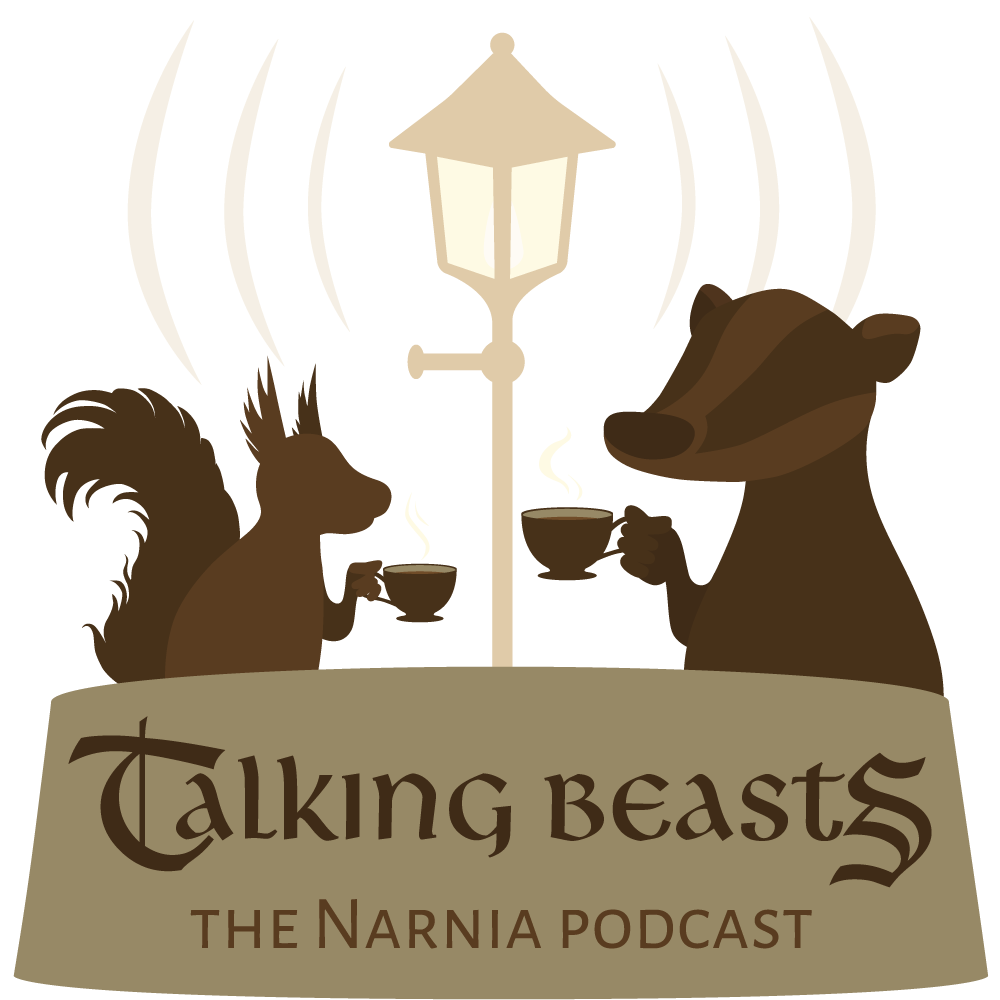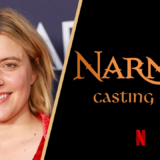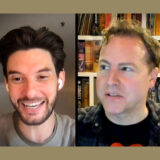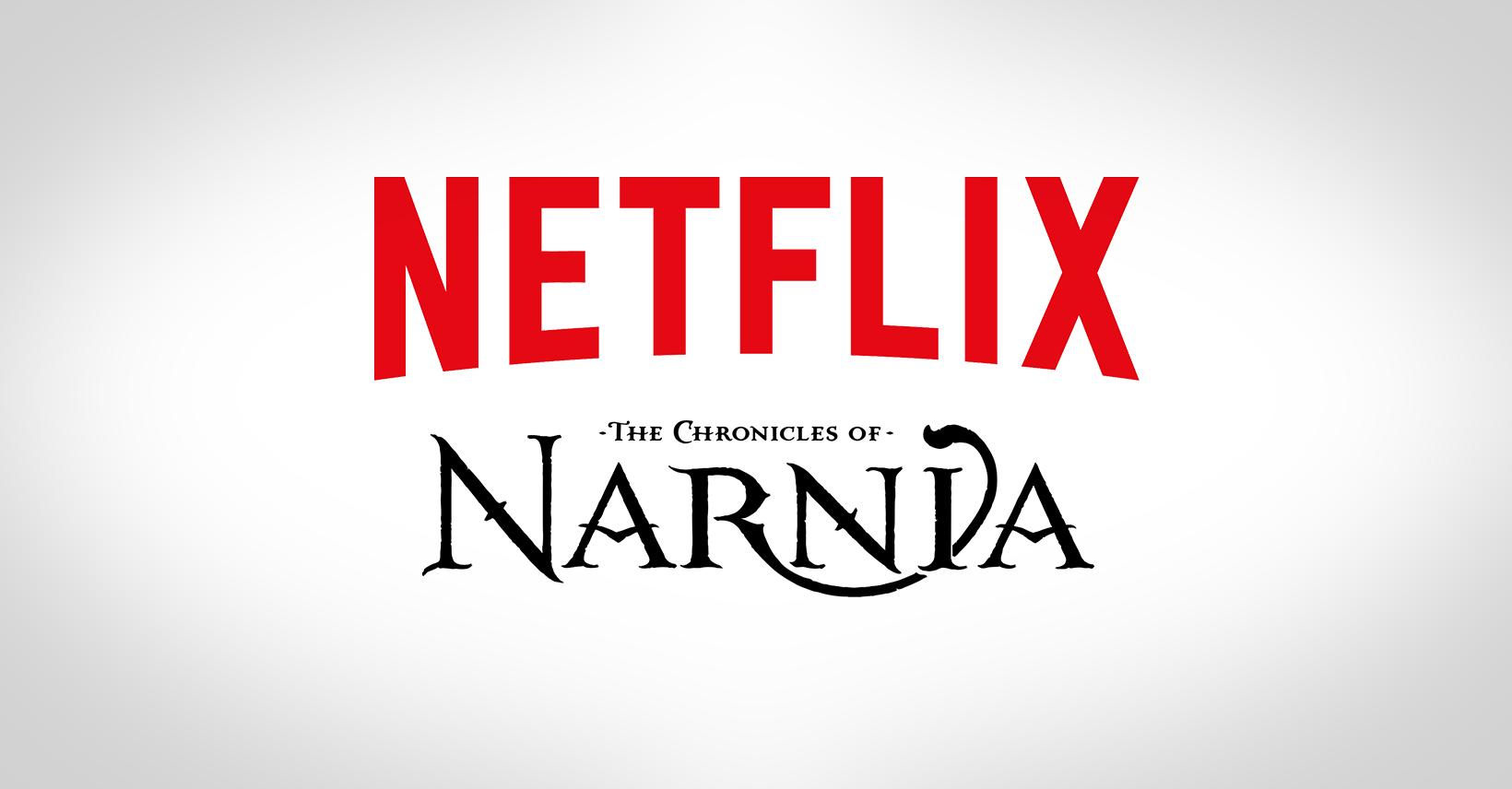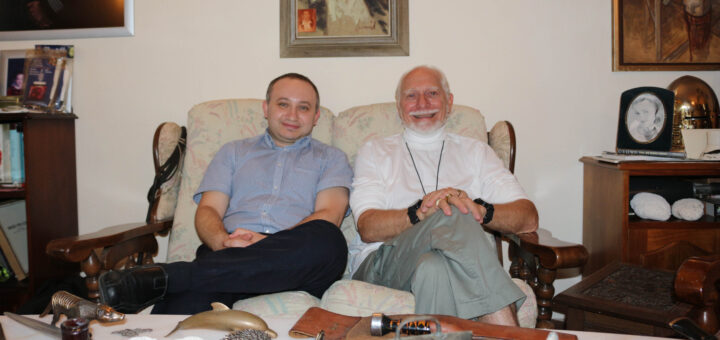
The following is a transcription of the 11/17/18 episode of Talking Beasts: The Narnia Podcast.
You may be familiar with some key points in the life of Douglas Gresham: His mother marrying C. S. Lewis (“Jack”) and his role as co-producer on The Chronicles of Narnia movies. But, there is a huge gap in the middle of his “complicated” life that few know much about. Those years will be covered in an upcoming documentary directed by Robert Cassar. Filming is underway but a release date has not been set.
Doug and Robert joined us from Malta to discuss the project.
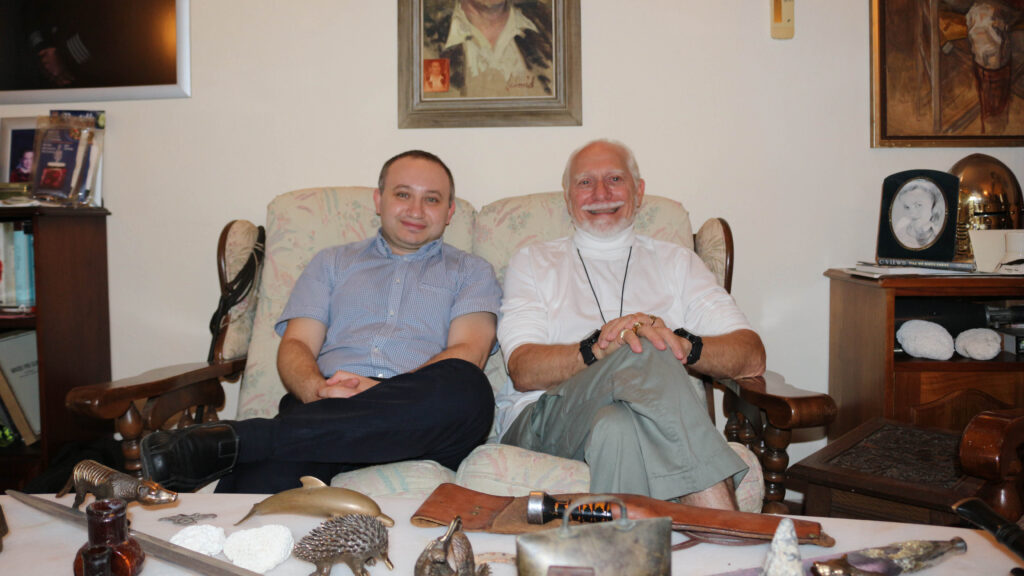
Glumpuddle: Doug, I know that you don’t like mythologizing people and putting them on pedestals, and C. S. Lewis (“Jack”) was just a human being after all. So, is there something you could tell us about the “real Jack” that you knew that might surprise readers that are kind of in awe of him?
Doug: [Laughs] I think to start with, the fact that he was incredibly untidy in his dress. He really did look like a retired farmer rather than a high level academic. I mean, his jackets had the elbows torn out of them and very often he wore slippers which he didn’t bother to put his feet into, he just trod on them and sort of shoved his feet down the front. He was just a scruffy individual to look at. But his huge personality of course completely overcame that.
There are many things about Jack that people probably don’t really know. One is that he never forgot anything he read. If he’d read a book, he could recite the book thereafter. And sometimes his students would challenge him on that and say “Is this true?” and he would say, “Well, go and pick a book from my shelves, any book you want.” And of course the student would always choose the dustiest looking one, the one that looked the most neglected, and bring it back. And Jack would say “Open at any page you like and read the first line” and the student would do so, and Jack would proceed to recite the book from where he left off. And of course that sort of shut them up pretty tightly [laugh]. He did just have this completely eidetic memory which is, for a writer and also a teacher, is a very, very useful thing to have.
Oddly enough, my mother had the same thing, too — she could sit down and pick up the score of a Mozart concerto, for example, read the book and then go and play it on the piano. She and Jack both shared this kind of incredible ability.
GP: Robert, I was thinking maybe you could do the same thing about Doug. You two have been friends for several years. Doug is a bit of a hero among NarniaWebbers. What is something you can tell us about the real Doug?
Robert: I’m trying to do choose the right words here…
Doug: Go on, go for it. I’m unarmed at the moment. [Laugh]
Robert: Good to keep in mind. [Laugh] I think the best way to describe Doug is his enormous generosity. I mean, I’ve never met anyone who thinks Doug is less than that. For example, he would work to help someone financially, emotionally sometimes, and it is not something that Doug likes to brag, but I would like to highlight maybe at this point in his life.
Doug: Well, thanks, Robert, but for me this is all just part of being a Christian.
GP: Which brings us to this upcoming documentary An Honest Life. Robert, what was it that made you want to tell this story?
Robert: There are several narratives in that story. First of all, I understood that Doug’s life did not end when, you know, his stepfather or real father and mother died back in the 60s.
Doug: That’s when it started, really.
Robert: And most people seem to say “This guy was just born with a silver spoon” when in reality it was not that. This guy had to pass through a lot of ordeals. And I wanted to capture that. There is no dramatic license in this documentary, so I wanted to say this as honestly as possible. And when me and Doug started conversing about this, he said “I’ll say yes on one condition: it has to be told honestly.” And that working title stuck in a way.
Doug: So far, anyway.
Robert: So far. [Laugh] It’s an endless discussion about the name, but the subtitle will always be that. We have to tell the story as honestly as possible. Also, the documentary will not tell Doug’s life through “talking heads,” as I like to call them, where people describe him. I’m going to use as much of Doug as possible. He’s going to narrate it, he’s going to appear on screen as much as possible. Why? Because who else on earth can tell his story but himself?
Doug: And I’m good at it. [laugh]
Robert: I think you’re getting better at it.
Doug: I’m getting better at it. He’s training me carefully. [Laugh] I think it is important though to say the term “an honest life” in this case does not necessarily mean that I’ve always led an honest life. It took me many years to realize that I was making a mess of my life and to realize that the only thing I could really do to help is to turn it over to Christ. Since I’ve done that, my life has been a very different kettle of fish. We’re not going to hide any of these things. We’re not going to sort to tell stories about other people, but we’re certainly going to tell the truth about myself because I think that’s important.
Robert: When you try to distill your story to fit a 3-act narrative, that’s not life. That could be a Cinderella kind of story, but it’s not our story. If you read his first biography — calling it the first because it was your first attempt at understanding your life, retrospectively — then now at his second attempt is through this documentary and it is more fresh, is more real, more honest in a way. And it is strange that most people seem to think that Doug’s life story is simple.
Doug: [Laugh] I wish it had been!
Robert: This guy lived across three different continents, he lived a multitude of lives. I mean, let mecount his careers. So, you were a farmer… a broadcaster…
GP: A private investigator, right?
Doug: Yes, a private investigator. Armed security agent.
Robert: A firefighter, I mean the list is endless.
Doug: Stage emergency services coordinator.
Robert: As you can see, we’re going to have an extended cut. [Laugh]
Doug: I’ve lived a pretty complicated life. I’ve always enjoyed adventures. And being a fire officer is an adventure every time. And it also usually winds up helping people, which is something else. I’ve always loved helping people. It’s something that I was born with, I guess. And becoming a state of emergency services coordinator, the same thing applies.
I desperately needed money for most of my early life and was fond of a variety of different legal ways of obtaining it rather than turning to the illegal ways. I’ve been a broadcaster on radio and television before, and I’ve done all sorts of weird things. But to me this is just been the way my life is, you know. It’s not something strange. I mean, others find it weird and wonderful and amazing, but it’s just the way things panned out for me. And I’m very grateful that’s the way it happened.
GP: Lenten Lands, of course, is the autobiography you published in the 1970s. How does the story of Lenten Lands compare to the story of this new documentary?
Doug: Robert, what would you say to that?
Robert: Lenten Lands was a book written through a lengthy interview that Doug did in the 70s.
Doug: Yes, with The Wade Center.
Robert: And I watched it in its entirety and it’s quite a long interview. But it’s like someone asked you how to felt and you said how you felt. This documentary is not like that. This documentary is basically going to the places that these things happened. For example, in a few weeks we’re going to Tasmania, and that’s where — how many years did you live there? At least two decades.
Doug: Lots. I can’t remember exactly [laugh], but lots. Probably twenty years or so.
Robert: In the book, it’s sketched in a way that he was a farmhand. But that’s it. So, he doesn’t talk about how that made him feel.
Doug: I can tell you about what farming made me feel: I loved every minute of it. I enjoy it and still enjoy it.
Robert: Another area this documentary captures is the feelings of grief that Doug had to pass through when he lost his parents. In the book it was described. In our documentary it is narrated. It is told, it is expressed. There were scenes where, you know, I hoped the camera was on. [Laughs] I was like “I hope the camera is on because we’re capturing moments—”
Doug: There were other times we wished the camera was off, too. [Laugh]
Robert: And there were times we were not sure something should make it to the cut or not. In reality it’s the narrative which drives the documentary. So, some people tell me “Do you plan ahead?” We do a lot of planning and Doug will know I plan meticulously — and in fact his nickname for me is–
Doug: “Meticulous.” Very like a Roman legionary.
Robert: And you know, he’ll say “I think we got it in the can, but let’s do one more.” And the fourth take he will say something that was not told in the other takes. And it is usually the one that is more honest in a way
Doug: More stuff comes out. He’s a very good inquisitor.
Robert: The book captures something but it’s like taking a sample of a cake. And the movie will be the cake.
GP: Doug, I think you’re in about your late 20s at the end of Lenten Lands. Is this kind of a continuation of that?
Doug: Yeah, I guess. The book ends with Warnie’s funeral [C.S. Lewis’ brother]. and I would have been mid, late 20s at that time. I think probably we are going to look back at that sort of thing as well, but we are moving ahead much further–that’s 30 years ago, more than that. So, there’s a lot to fill in the meantime. An awful lot of adventures have happened since then.
GP: Doug, I think everyone just assumes you’ve always worked for the C. S. Lewis Company but of course that’s not true. How did that come about?
Doug: I’m the only man who can do the job. I am the last dinosaur of a dying race. There is only me left. I’m the only man alive who lived with C. S. Lewis and got to know him very very closely. I was at his funeral and I was at Warnie’s funeral and so on. There aren’t any men alive who have shared those characteristics. But I suppose I got entangled with the C. S. Lewis Company – which was founded shortly after Warnie died – because I felt it was a debt I owed to Jack. He raised me from the age of about 8 to the age of 18. For ten years he spent a lot of his energies trying to teach me to be a good human being and trying to teach me things I ought to know, a lot of which he was completely right about though I rejected some of the stuff at the time. And so he put a lot of effort into me and I feel very strongly that I owe him a debt of gratitude and therefore I should be doing the very best I can to look after his books and his writings and make sure they stay in the public eye. Jack’s works are so important that it’s very valuable they stay in print all the time. So, we work hard to make that happen. I guess it’s just the fact that people in the company realized I knew Jack better than anyone alive and probably knew the works better than most people as well so I just regard it as a duty I suppose.
Robert: There’s a part of the documentary where Doug mentions A Grief Observed. And you were actually one of the first ones to have seen the manuscript.
Doug: I was probably the first person who saw it. It made me cry the first time I illegally read it–I knew what drawer he kept it in his desk upstairs. I started glancing through it, and it made me cry then, it makes me cry now
Robert: That’s not something that can be replicated. Some people ask Doug “What would C. S. Lewis say?” “I don’t know but I was there when he wrote it.” [all laugh]
Doug: There are also–at the moment there seems to be a fad for creating or inventing or attributing quotes to C. S. Lewis that he never said.
GP: That’s still a problem, absolutely.
Doug: That is a problem! And a lot of people will write to me and say “Is this real?’ and I say “It may be real but C. S. Lewis didn’t say it” [laugh] There are a lot of those things hanging around. In fact, someone (William O’Flaherty) even wrote a book called [The Misquotable Lewis]. It’s a pretty useful tome for me to check every now and again to make sure I’m right about something. But I’ve seen so many things that Jack is supposed to have said that just don’t gel with Jack’s personality, his way of speaking, or anything at all about him. So, I can usually pick up the fake ones pretty quickly.
GP: Yeah, and with the explosion of social media, the phony Lewis quotes have become even more of a problem. I’m glad we got to give William O’Flaherty a shout-out. He also has a website and a Facebook page just dedicated to setting the record straight on those quotes.
Doug: Good for him, I appreciate that wherever you are; I really do appreciate that, thank you.
GP: Robert, apart telling the story of Doug’s life and C.S. Lewis, what are some of the lessons or themes you hope people will walk away with when they see this documentary?
Robert: The universality of guilt. That mistakes in our lives that make us think we’re not worthy of living a good life. By a good life I don’t mean not a rich prosperous life, but a good inner life. There was a scene in Oxford where Doug passed from this world…
Doug: Briefly into the next, yes. When you read it, you can’t really get the jist of it as well as when one talks about it. But it’s very difficult to explain.
Robert: I think we did four takes on that?
Doug: Probably, yeah. We had some difficulties at the time with people who wanted to come and shake my hand so I felt like I got mobbed in the church yard but it was quite fun.
Robert: We were always being interrupted by people who are fans of Doug and would recognize him. And for me it shows how much this movie will find an audience.
Doug: I think you’re right, yes, I think you’re right. I think it also points out we’re not the sort of people who will just push people away. We just don’t do that kind of thing.
There was a lovely episode in The Bird and Baby pub being in Oxford for example. This guy has a mischievous sense of humor by the way. We went in there so I could show him the place and we found all the photographs of Jack and Warnie and Tollers and others on the wall. And there was a young couple ardently taking photographs of these pictures on the wall. And Robert asks “why are you taking photographs of these pictures?” And the boy or the girl, I can’t remember which, said to him “Well we’ve come all the way from Canada to take photographs of these pictures. That’s C.S. Lewis!” And Robert says “Well why are you taking pictures of pictures when you’ve got his stepson standing just over there?” [laughs] It started out what turned out to be a delightful interval with this couple from Canada who came all the way over here to take pictures and found me in the pub. Eventually they told us I’d made their entire trip. Which was just very beautiful. And it was their honeymoon. We could have shunned them, we could have turned and walked away, but it’s just not the right thing to do if you know what I mean. They were delightful people.
GP: Doug, we’ve talked a lot about the past. What do you think is next for you?
Doug: Well, being someone who has dedicated everything I have and everything I am to Christ, that’s a very difficult question to answer. We were farming quite happily in Tasmania and the Lord moved us suddenly to Ireland to run a Christian psychotherapy and ministry there, which lasted nearly fourteen years. Then he moved us to Malta where I am now. He plunged me into the film business and so on. So I really do whatever the Lord sends across my path. Robert is one of the things the Lord laid across my path. And I haven’t shot him yet, so I guess he’s doing alright.
[laughter]
Robert: We have a very pleasant relationship.
Doug: We’re good mates. Sooner or later, I guess I’ll have to stop. I’m 73 years old, so I ought to be slowing down. I still drive fast cars and motorcycles. So I’ve not given up the ghost just yet, I hope.
Robert: Our next trip is Tasmania and Australia. We’re going to be with his eldest son James. And we hope to capture, during those two weeks of filming, the years that we’ve lost. Those 20-30 years where Doug had to work—
Doug: Any job I could get, yeah.
Robert: And also, I think that sometimes [people think], “Well of course Doug is a Christian, he’s the stepson of C. S. Lewis,”
Doug: [laughs] It didn’t work that way.
Robert: In the documentary, It might be at about 70 minutes that he becomes what you would call a Christian.
Doug: I didn’t hand myself over to Christ until I was 45 years old. So, I got through an awful lot of sinning before then. I was good at it, let’s face it! [laughs]
GP: Well, we are certainly looking forward to seeing the final edit. Thanks so much for being on Talking Beasts.
Doug: It has been a pleasure.
Robert: A pleasure.
Transcription by
The Rose-Tree Dryad, Fantasia Kitty, and Meltintalle

